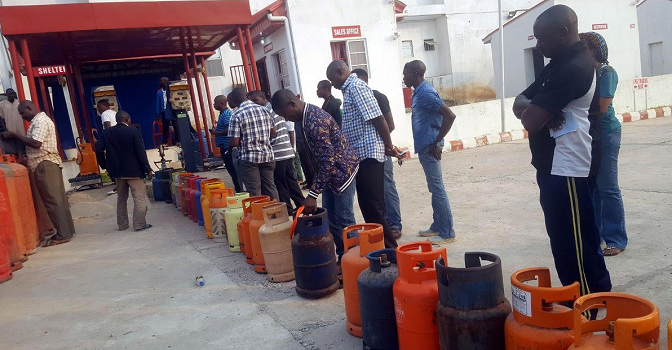As Nigerians continue to grapple with the rising cost of petrol, an associated, concerning trend has emerged in the prices of Liquefied Petroleum Gas (LPG), commonly referred to as cooking gas. The price for cooking gas has surged to N1,500 per kilogram, with notable increases recorded in major cities such as Ogun and Lagos. The Managing Director of NIPCO Plc, Suresh Kumar, remarked on the potential for local refineries, including the much-anticipated Dangote refinery, to alleviate these high prices. Kumar expressed alarm at the fact that over 60 percent of the cooking gas consumed in Nigeria relies on imports, which exacerbates market volatility and pricing challenges for consumers who depend on LPG for daily cooking.
Recent market checks indicate a 41.6 percent increase in the price of cooking gas in Abuja, where refilling a 12.5kg cylinder now costs N17,000, a significant rise from the N12,000 price point in July. Such steep increases in cooking gas prices have far-reaching implications for consumers, many of whom are already negatively affected by rising living costs. In various districts, prices fluctuate, with reports of cooking gas sold between N1,300 and N1,400 depending on the location. The situation has prompted concerns from local officials, such as Ogun State’s Commissioner for Environment, who warned that households may be forced to revert to less costly and environmentally damaging options like charcoal if LPG prices continue on this trajectory.
The government’s response to this escalating issue has been mixed. In August, the Minister of State for Petroleum Resources, Ekperikpe Ekpo, pledged to implement strategies aimed at reducing the price of cooking gas, including engaging regulators and gas producers. Despite such assurances, current assessments reveal no significant decline in LPG prices; in fact, they appear to have exacerbated the burden on consumers. Suresh Kumar emphasized the need for bolstered local production, noting that as of now, less than 40 percent of the 1.5 million metric tonnes consumed in Nigeria is produced domestically. He advocates for greater support from the government for major companies to enhance their domestic production capabilities, which could lead to a reduction in pricing reliant on imported supplies.
The NIPCO MD expressed optimism that domestic production could indeed help stabilize and potentially lower gas prices. He posits that local refineries, particularly those sourcing crude oil, will enhance the domestic supply chain’s ability to meet consumer demand without highly fluctuating international pricing dynamics. Kumar articulated a vision for reduced reliance on imported LPG, which would not only make gas more affordable but would also contribute to a significant expansion of necessary infrastructure, such as pipelines and storage, across Nigeria. This development could also spark an influx of investments in LPG facilities and retail outlets, which would further normalize prices for consumers as supply increases.
Highlighting NIPCO’s foundational role in the market, Kumar noted that the company has evolved from primarily marketing white petroleum products to positioning itself as a leader in LPG marketing and distribution. Since its inception in 2004, NIPCO has significantly ramped up investments in LPG infrastructure, growing its operational capacity from 5,000 metric tonnes to over 20,000 metric tonnes over the years. This surge in local capacity is vital, given that Nigeria holds vast natural gas reserves, and the potential for growth in domestic gas consumption remains substantial as less than 60 percent of the population has adopted LPG for cooking.
In light of the stagnant demand for LPG attributed to recent high prices, Kumar calls for collaborative efforts with the Nigerian government and relevant regulatory bodies to tackle issues related to gas flaring. He emphasizes the need for additional investments to capture and process flared gas, which could dramatically increase production capabilities from the current 1.5 million metric tonnes to at least 5 million metric tonnes annually. Kumar’s outlook believes that while the current market is challenging, the entry of new players into the gas processing sector could lead to market stabilization and correction in the near future, reopening pathways for growth in LPG consumption, ultimately benefiting the Nigerian population.
In conclusion, the pressing issues surrounding the rising costs of cooking gas in Nigeria demand urgent attention and intervention from both the government and industry stakeholders. Enhanced domestic production via local refineries, increased infrastructure investments, and strategic government support could collectively play a pivotal role in addressing these challenges. By bolstering the local gas supply chain, Nigeria could not only stabilize LPG prices in the long term but also encourage wider adoption of this cleaner energy source, positively impacting the lives of millions across the nation.














